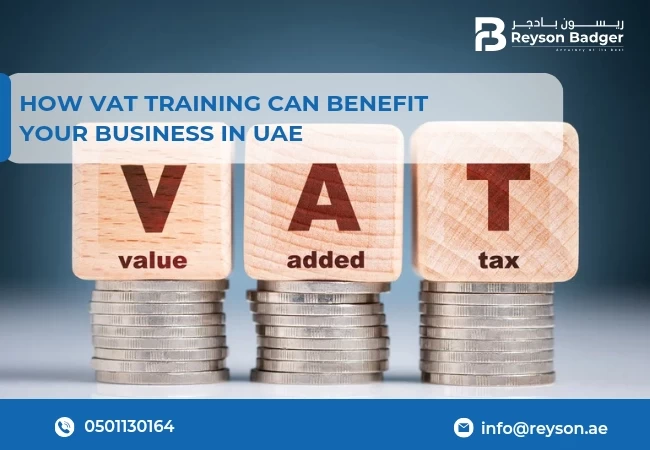

In January 2018, the United Arab Emirates (UAE) implemented Value Added Tax (VAT). This changed how taxes work in the country. Now, businesses in the UAE need to understand VAT rules, how to register, and how to report properly. If they don’t, they could face penalties, fines, or hurt their reputation. Because of this, VAT training is now really important for businesses here. It helps them stay compliant, avoid mistakes, and make the most of VAT.
1. Compliance with VAT Laws and Regulations
VAT training ensures that businesses understand and adhere to the complex VAT laws and regulations established by the UAE Federal Tax Authority (FTA). This knowledge helps prevent legal issues and penalties associated with non-compliance.
2. Minimization of Errors and Penalties
Getting the right training greatly lowers the chance of mistakes in VAT filings and calculations. By understanding the requirements for accurate invoicing, record-keeping, and filing, businesses can avoid costly penalties that arise from mistakes or late submissions.
3. Maximization of VAT Refunds and Benefits
Training equips businesses with the knowledge to effectively manage their VAT processes, including claiming refunds on input tax. This maximization of VAT benefits can lead to improved cash flow and reduced operational costs.
4. Improved Financial Management and Accounting
VAT training enhances financial management practices by teaching businesses how to integrate VAT into their accounting systems. This leads to better financial reporting, transparency, and overall management of tax liabilities.
5. Enhanced Reputation and Credibility
Completing VAT training demonstrates a commitment to compliance and professionalism, enhancing a business's reputation in the market. This credibility can attract more clients and partners who value transparency and adherence to regulations.
1. VAT Registration and Deregistration
Training covers the procedures for registering for VAT, including understanding thresholds for mandatory registration and the process for deregistration when necessary.
2. VAT Returns and Submissions
Participants learn how to prepare and submit VAT returns accurately, including timelines, required documentation, and common pitfalls to avoid.
3. VAT Invoices and Receipts
The training includes guidelines on issuing compliant tax invoices and receipts, which are crucial for both customers and tax authorities.
4. VAT Exemptions and Zero-Rated Supplies
Understanding which goods and services are exempt from VAT or subject to zero-rated supplies is essential for proper compliance and financial planning.
5. VAT Penalties and Fines
The training addresses potential penalties associated with non-compliance, helping businesses understand the importance of adhering to regulations to avoid financial repercussions.
VAT training is crucial for different professionals engaged in financial management and compliance within businesses. The following groups should consider attending VAT training:
1. Business Owners and Entrepreneurs
Business owners need to understand VAT regulations to ensure their companies comply with tax laws, manage cash flow effectively, and make informed strategic decisions.
2. Financial Managers and Accountants
Accountants and financial managers are essential in handling VAT responsibilities. Training equips them with the knowledge to handle VAT calculations, reporting, and compliance efficiently.
3. Tax Professionals and Consultants
Tax professionals and consultants must stay updated on the latest VAT regulations and practices to provide accurate advice to their clients. Training enhances their expertise in navigating complex tax scenarios.
4. Employees Responsible for VAT Compliance
Employees tasked with VAT compliance, such as those in accounting or finance departments, benefit from training that helps them understand their responsibilities regarding VAT registration, invoicing, and filing returns.
Selecting the right VAT training provider is crucial for ensuring effective learning outcomes. Here are some factors to consider:
1. Find Firms with Knowledge of UAE VAT Laws and Regulations
Choose a training provider that specializes in UAE VAT laws to ensure that the content is relevant and up-to-date with current regulations.
2. Check for Training Programs Tailored to Your Business Needs
Select providers that offer customized training programs addressing specific industry requirements or business challenges related to VAT.
3. Consider Providers That Offer Interactive and Engaging Training Methods
Interactive training methods, such as workshops, case studies, and practical examples, enhance learning experiences and retention of information.
4. Examine the Testimonials and Reviews of Past Participants
Research feedback from previous participants to gauge the effectiveness of the training program and the provider's reputation in delivering quality education.
Conclusion
VAT training is crucial for businesses in the UAE. It helps them understand the rules about VAT and stay compliant. This way, they can avoid mistakes that might cost them money. Knowing the VAT regulations means businesses won't face penalties and can keep their finances in check. Tax experts like Reyson Badger prove that VAT training is not a cost but an investment in your business's future. When companies invest in VAT training, they protect themselves and boost their reputation, which helps them succeed in the ever-changing market.